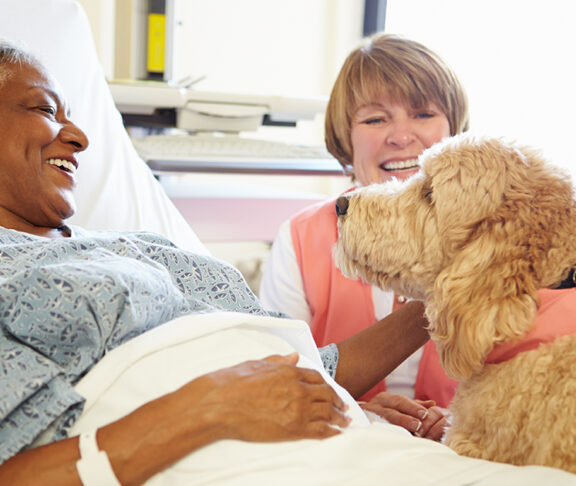Pets can be an incredible source of comfort and joy for anybody, but for cancer patients, pet therapy can provide emotional and psychological support to enhance a person’s overall well-being.

Michael Sapienza
Also known as animal-assisted therapy, activities, or interventions, pet therapy involves trained animals — often dogs — providing companionship to individuals in need. Several studies have indicated the potential benefits of utilizing pet therapy to support oncology care.
By exploring the many ways in which pet therapy can benefit cancer patients, we seek to inspire avenues of support for colorectal cancer patients, survivors, and caregivers.
Pet therapy to improve mood and overall well-being
It’s no secret that animals make people smile, but feeling a sense of emotional support can mean all the difference for someone facing a cancer diagnosis. The unconditional love and companionship offered by therapy animals can help to alleviate feelings of loneliness, depression, and anxiety.
In a Systematic Literature Review of Animal-Assisted Interventions in Oncology, multiple studies were noted that suggest pet therapy can:
- Decrease levels of depression and anxiety
- Affect mood neutrally or positively
- Decrease stress
One study even showed how pet therapy helped to calm patients enough to improve communication with medical professionals.
While more consistent research is required to draw thorough conclusions, a growing body of evidence supports the neutral or positive effect pet therapy can have on a cancer patient’s overall well-being.
Incorporating pet therapy into cancer treatment
To reap the potential benefits of pet therapy, cancer patients can explore a variety of options.
Hospital programs: Many hospitals and cancer treatment centers have pet therapy programs in place. These programs bring trained therapy animals to the facility to interact with patients during their treatment or recovery.
Home visits: In cases where patients are receiving treatment at home, therapy animals and their handlers can make home visits. This allows patients to experience the benefits of pet therapy in the comfort of their own space.
Support groups: Some cancer support groups incorporate pet therapy sessions as part of their regular meetings. This provides an opportunity for patients to share their experiences and bond with others in a supportive environment.
As with any therapy, it’s best to speak with a healthcare provider first before starting.
The Alliance talks pet therapy for colorectal cancer
Each person and situation is unique. While pet therapy may not work for everyone, it can be a valuable resource to consider for many colorectal cancer patients, survivors, and caregivers.
Marianne Pearson, the Colorectal Cancer Alliance’s senior director of patient navigation, shares her insights surrounding pet therapy and colorectal cancer:
“Having worked in the cancer field for over 20 years and being a colorectal cancer survivor myself, I’m well aware of the benefits pet therapy can provide,” she said. “At the end of the day, we want people to get the help and support they need to beat this disease. If pet therapy can offer that, we’re all for it.”
As cancer patients navigate the challenges of their illness and treatment, the bond between humans and animals can make a significant difference. For more colorectal cancer resources and information, visit colorectalcancer.org.

